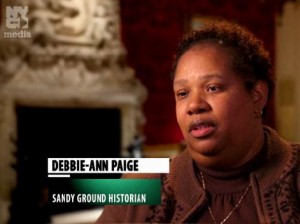
Debbie-Ann Paige recently appeared on Secrets of New York, which aired on NYC Life, as a Sandy Ground Historian.
In cooperation with the Sandy Ground Historical Society, College of Staten Island graduate student Debbie-Ann Paige has worked tirelessly over the past several years to document the presence of Underground Railroad way-stations on Staten Island.
Specifically, she has examined the participation of Louis Napoleon, a “conductor” on the Underground Railroad and an important link in the long chain of abolitionists who assisted self-liberated slaves as they passed through Staten Island and New York on their way to Canada. Her research has resulted in Louis Napoleons’s house being named a national landmark.
“Staten Island does not get enough attention as a stop on the Underground Railroad,” according to Paige, who joined the College to earn a BA in History after retiring from the military. Until Paige, very little has been said about how the free Black community of Staten Island played a role in the liberation of freed slaves.
“So much here needs to be uncovered,” said Paige when discussing Staten Island’s role in African American history.
Paige, who grew up in Staten Island, admits that she knew very little about Black history before she began researching the subject. It was not until she moved back to Staten Island with her husband who had served in the military for 20 years that she decided to return to CSI and study history. “I always had this love for genealogy,” she said, addressing why she chose history as her area of concentration. She then began studying slavery and started “narrowing the scope” to the abolitionists in Staten Island.
Paige is currently writing her Master’s thesis tentatively titled “Race and Anti-Slavery Politics on Staten Island,” but her work at CSI is only the tip of the iceberg. Along with writing her thesis, working 50 hours a week, and her work collaborating with Sandy Ground, she also recently appeared on an episode of Secrets of New York, which aired on NYC Life, as a Sandy Ground Historian discussing the Underground Railroad.
“I feel like a scholar,” Paige said, while discussing her accomplishments. “It’s an amazing feeling.”
The MA is not the final stop in Paige’s academic career. The founding member and first Vice President of the Phi Alpha Theta History Honor Society at CSI plans on obtaining a PhD in Archival Studies and hopes to one day work for a historical society of her own, gathering collections for museums and academic libraries. She credits her professors at CSI, namely Jonathan Sassi, Associate Professor of History and Chair of the History Department, for helping her focus by “constantly challenging me at every turn.”
“I have enjoyed working with Debbie-Ann Paige as her thesis advisor, because she combines her passion for history with a doggedness in the archives that has yielded original findings,” said Professor Sassi.
Paige’s work has even garnered national attention as the National Parks Service designated Louis Napoleon’s house a national landmark due to her research.
“While historians have long acknowledged the importance of Staten Island resident abolitionists like Sidney Howard Gay, secretary of the American Anti-Slavery Society, and the Shaw family of St. George, very little has been said about how the free Black community of Staten Island played a role in this story. I am proud that Ms. Paige’s efforts have resulted in the National Park Service officially recognizing and commemorating Napoleon’s participation,” noted Catherine Lavender, Director of the American Studies Program and Associate Professor with the College’s History Department.
The work was a labor of love. Paige said that she relishes the opportunity to prove her ideas to other academics. “I love the research. I love the hunt,” she said. “Not enough scholars give genealogy, the micro-economics of history, enough attention.”

![[video] The Underground Railroad’s Trail to Freedom](https://csitoday.com/wp-content/uploads/2012/05/Debbie_Ann_Paige_5_31_2012.jpg)


![[video] “Trouble on the Border: How Drugs and Violence Have Shaped Place”](https://csitoday.com/wp-content/uploads/2014/03/beef-cattle.jpg)












